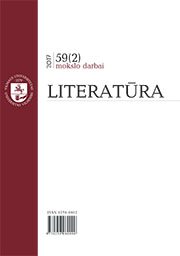Роман Андрея Иванова «путешествие Ханумана на Лолланд» как провокация современного читателя (на основе постулатов рецептивной эстетики)
Hanuman’s Journey to Lolland by Andrey Ivanov as a Provocation of the Modern Reader (Based on the Postulates of Reception Aesthetics)
Author(s): Aleksandra ShalkineSubject(s): Studies of Literature, Aesthetics, Theory of Literature
Published by: Vilniaus Universiteto Leidykla
Keywords: horizon of expectations; provocation; anti-cosmopolitanism; journey; parody; system of characters;
Summary/Abstract: A brief summary of the main concepts of Jauss’s aesthetic reception theory is followed by an analysis of the novel Haluman’s Journey to Lolland by Andrey Ivanov. By provoking the reader, the author constantly attempts to move their horizons of expectation. Ivanov creates a “novel without a plot” and calls it a travelogue, despite the fact that the storyline does not involve an actual journey. By parodying the chivalric romance and the subsequent jester’s romance, the author actualizes the aspects that are import to him and explains the characters’ “philosophy of nonresistance.” Ivanov’s novel is set in a Danish refugee camp, which acts as a parody of the 20th century European social and economic structure. Ivanov’s provocative anticosmopolitanism makes the reader adopt a new perspective on the European policy of refugee integration. Furthermore, the author flirts with the dream of the Soviet people to move to the US, the interpretation of Buddhism and religious postulates, the traditional notion of a respectable life goal and other aspects. The second part of the article concerns the system of characters. First of all, the toponym “Lolland” is analyzed; then, the names of the main characters (e.g., Hanuman, Eugene, Yevgeny and other variants) are examined. At the same time, a brief analysis of intertextual relationships demonstrates how Ivanov adopts ethical questions raised in the works of classical writers, such as Alexander Pushkin, and transfers them to the 20th century or attempts to find an answer in the modern world with its moral principles. In addition, intertextual relationships with Russian folklore, works by N. Karamzin as well as I. Ilf and E. Petrov are described. The 20th century issue of a lost motherland is also discussed. In conclusion, it can be argued that by provoking the reader in various ways, the author focuses on people of different ages and makes his novel comprehensible and attractive for people of different generations.
Journal: Literatūra
- Issue Year: 59/2017
- Issue No: 2
- Page Range: 149-162
- Page Count: 14
- Language: Russian

